
Sunday, November 26, 2006
Saturday, August 19, 2006
New York Times Publisher, Arthur Sulzberger Jr. Apologizes for a Generation
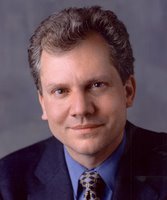
On May 21, 2006, the publisher of the paper of record gave his first ever commencement address to the State University of New York at New Paltz (I'm from the Midwest - I'd never heard of this place before). His remarks are striking, because in them, he not only apologizes for the Boomer generation falling short of their lofty ideals but leaving the world worse off than what they found it. Actually, the way the world is as he describes it, it sounds like we're back in 1968 - smack dab in the middle of the Vietnam War. Sulzberger's words are also a call to action for us and for the Millenials to take charge and fix this mess. I couldn't agree with him more. The key word - the theme is ENGAGE!
Here's the text of the speech. Please read the entire thing. The link to it is found at the bottom.
"Good morning and my most heartfelt congratulations. As the father of two relatively recent college graduates, I know how important this moment is to all of you. Whether mother or father, you are now breathing a huge sigh of relief. Your child has the possibility of a future and, while the bills remain to be paid, at least they’ve stopped growing. But as much as I’d like today to be about us parents, I know it’s not. It’s about the rest of you – our children and our future. So, to all of you – well done.
This is my first ever commencement speech and, depending on your reviews, maybe my last. Worse, the truth is I even skipped my own graduation. It was a glorious day. My cousin and fellow graduate and I heard the road calling.Motorcycles; speeches – no brainer. Thank goodness it’s gray and overcast today, so most of you are here.
So, given my lack of commencement experience I prepared for today the way good journalists are supposed to – I reported out the story. I read what generations of other commencement speakers had said and what themes they hit. Ninety five percent of them come down to this: “Today you enter the real world. Follow your heart. Find what you love and do it.” Who can argue with such wisdom? It’s sort of a motherhood and apple pie statement. It sounds so easy.
So let’s all tip our hat to the honesty of our favorite non-news caster, Jon Stewart of the Daily Show. Two years ago he told a graduating class at William and Mary:
“So how do you know what is the right path to choose to get the results you desire? The honest answer is this. You don’t. And accepting that greatly eases the anxiety of your life experience.”
As a journalist; as a media executive; as a human being -- I come to you fully aware of the need we all have to heed Mr. Stewart's words and ease our anxieties. The vagaries of life are enormous, and it is those very vagaries about which I want to talk with you.
I’ll start with an apology.
When I graduated from college in 1974, my fellow students and I had just ended the war in Vietnam and ousted President Nixon. Okay, that’s not quite true. Yes, the war did end and yes, Nixon did resign in disgrace – but maybe there were larger forces at play.
Either way, we entered the real world committed to making it a better, safer, cleaner, more equal place. We were determined not to repeat the mistakes of our predecessors. We had seen the horrors and futility of war and smelled the stench of corruption in government.
Our children, we vowed, would never know that.
So, well, sorry. It wasn’t supposed to be this way. You weren’t supposed to be graduating into an America fighting a misbegotten war in a foreign land.
You weren’t supposed to be graduating into a world where we are still fighting for fundamental human rights, be it the rights of immigrants to start a new life; the rights of gays to marry; or the rights of women to choose.
You weren’t supposed to be graduating into a world where oil still drives policy and environmentalists have to relentlessly fight for every gain. You weren’t. But you are. And for that I’m sorry.
Starting today, it will be more and more up to you to decide what world you will bequeath to your children (yes, most of you will be having children – it just goes with the territory). As you continue to make the choices that define your life – and by the way, attending and graduating from college was a critical one – you also will be defining the world you live in. Think of it as your personal version of what in the scientific world (or perhaps the science fiction world) is known as the butterfly effect. The butterfly effect holds that the smallest of actions -- say, the flapping of the wings of a butterfly in the mountains of Bolivia -- can lead over time to enormous consequences -- say, a hurricane in Africa.
Each of you will face many crossroads, some of them seemingly small and inconsequential. You will choose at each point whether to be bold or hesitant; inclusive or elitist; generous or stingy. And each one of your choices will result not only in how people define you. Each one will help shape the world you make for the rest of us.
So I have a plea and I have a piece of advice. The advice is to focus on the small decisions, because they add up very quickly. And I don’t mean what job you take or what town you live in. Those will change as you change. I mean decisions like whether to pick up that overturned trash can or whether to stop for that stranded motorist. Those are the decisions that can change our world just as surely as a butterfly can create a hurricane.
Yes, it’s important that those of us at The New York Times have the courage of our own convictions and defend the rights of our journalists to protect their sources or, after much debate and discussion, publish the news that our government is bypassing it’s own legal systems to tap into phone calls made to and from the United States.
But those big decisions rest on a stable foundation which has been built by thousands of small decisions – from the way we protect our reporters and photographers in war-torn areas such as Iraq (and even then lose too many) to how we’ve shattered the glass ceiling that for too long stopped women from moving into the highest levels of leadership.
And my plea is: engage. Our world needs you. It needs your energy and your caring; it needs your commitment and your values. If we don’t get them our society – all of us – will continue to aimlessly drift, failing to make our country and our world a place that makes us proud.
Engage. Help make decisions. Vote. Read a newspaper (what, you thought the publisher of The New York Times wouldn’t get there?) Knowing what’s happening in your world, your country, your neighborhood is the critical precursor to being a citizen of a democracy. Each one of you who forsakes your role in keeping our democracy alive by either inaction or, perhaps worse, by action based on ignorance, threatens all the rest of us. So, read a newspaper and build a community.
As you already heard, I’m here in large part because I’m a rock climber. I work in New York City but I come to New Paltz to clear my head and batter my body against those beautiful cliffs up there. And this ties in to another bit of reporting I did in preparation for today. I found what may well be one of the shortest commencement speeches every given.
It was 1941. Following what was no doubt an excessive introduction, - sort of like mine - our speaker walked to the lectern, glared out at the assembled multitude and in his trademark bark intoned: “Never give in, never give in, never, never, never, never -- in nothing, great or small, large or petty -- never give in except to convictions of honor and good sense.”
And then Winston Churchill sat down.
With a philosophy like that, Sir Winston would have made one hell of a rock climber. Life is relentless. When you think you’ve made the crucial move – what in climbing parlance is called The Crux – it always throws you another one. And another. And another.
These are the vagaries of which I spoke earlier in these remarks. In my experience, the only way to prepare for them is inside each of you. It is not about the job you have or the money you make. It is about commitment and courage; it’s about caring and fortitude. It’s about supporting those around you and, just as importantly, it's about letting them support you. In the parlance of the climber, trust that you’re “on belay”.
Engage; get the small decisions right; never give in and please -- please – build us a world of which we can be proud. Go make a damn difference.
None of you wants to be standing where I am 30 years from now apologizing to the next generation of bright and shiny college graduates.
Thank you."
Arthur Sulzberger Jr.
http://www.newpaltz.edu/commencement/sulzberger.html
Statements in bold are bold in the original.
Sunday, July 23, 2006
Maybe Ross Perot was right about NAFTA - "A giant sucking sound"
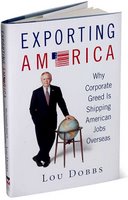
I'm reading Lou Dobbs' book, Exporting America: Why Corporate Greed is Shipping American Jobs Overseas, and I think the book really speaks to members of our generation. By 2015, 3.4 million white collar jobs will be outsourced and not just manufacturing jobs (Dobbs 34). He makes some very compelling arguments about how businesses have forsaken their responsibility to the communities in which they've thrived for years and years, pulling up stake and heading off to SE Asia or down South across the border. There are going to be fewer and fewer jobs available that cannot be outsourced in the future, especially when you have CEOs like former chairwoman of Hewlett-Packard Carly Fiorina callously saying what other CEOs were thinking:
"No American has a God-given right to a job."
Yeah, the last time I checked, a job wasn't one of the three natural rights nor inalienable rights either. Is a job a civil right? I hesitate to say yes because I fear what that would mean to the government's national debt. But, on the other hand, I grew up in the Detroit area, a place known for being a bit of union town. My family has worked for the Big Three in the past. No one should have the right to make a living taken away from them. Nor should that means to making a living be a crappy one - the New Deal saw to that. For the past twenty five years or so, both Democrats and Republicans have danced the deregulation dance. Influenced by lobbyists, seen as a way to "improve competition and lower prices for the consumer" (I made up the quote so don't quote me), we end up with Clear Channel owning 10% of all the radio stations, tons of billboards and concert halls with which they can effectively freeze out any musical act that doesn't kiss their ass. We also end up with billions in the scam of the savings and loan fiasco in the early 1990s. Enron was also the beneficiary of energy deregulation; need I say more? In the end, the consumer gets screwed by footing the bill.
I digress. When companies layoff workers, they "are essentially firing their customers" (Dobbs 19). Not only that, between the exploding national debt and the monstrously unbalanced trade deficit, we're now over 3 trillion in hock to foreign countries like Japan and China. Thank God these countries keep investing in U.S., otherwise if they pull a Indonesia a la 1997 when the investors yanked all of their money out of that country and sent their currency crashing, we're screwed. The U.S. bailed SE Asia out back then to prevent a global meltdown. I doubt China or the EU could do the same for us if that happened today. That "giant sucking sound" that Ross Perot mentioned is money being sucked out of the U.S. into those other countries that we are now indebted to. In an effort to become more competitive (outsourcing), we are becoming less competitive because we'll be hamstrung by such a huge debt. And please tell me debt doesn't matter. Tell that to members of Gen X and the Millenials who are maxed out on their credi
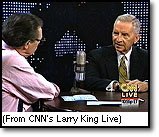 t cards and can't get out from under their bills. Household debt, national debt. It all matters.
t cards and can't get out from under their bills. Household debt, national debt. It all matters.The reason all Americans should be for fair trade, not free trade, is that it makes America less competitive in the long run, though it might look like a short term gain. And, I really never understood why those folks protested the G8 summits and WTO meetings until now - I'm sure there's more I'm missing besides just the jobs thing. It probably has to do more with the poor workers in the other countries and environmental laws and all that. But, I'm sorry, I'm going to focus here on Americans and how are jobs are disappearing first before I worry about somebody else in another country.
I'll add more on this later as I finish the book. Go out and buy it.
Thursday, July 13, 2006
Famous Gen Xers

Who are some famous Gen Xers? Glad you asked.
Jeff Bezos, founder of Amazon.com
Nicholas Cage, actor
Bret Easton Ellis, author of Less Than Zero, American Psycho, and Lunar Park
Eddie Vedder, lead singer of Pearl Jam
Michael Dell, founder of Dell, Inc.
Chris Rock, comedian and actor
J.J. Abrams, TV producer, writer of Alias and LOST
 Kurt Cobain, Harry Connick jr., and Dave Matthews, musicians all born in 1967
Kurt Cobain, Harry Connick jr., and Dave Matthews, musicians all born in 1967Tony Hawk, skateboarding legend
Robert Rodriquez and John Singleton, directors
Tucker Carlson, conservative TV commentator
Ice Cube, rapper and TV producer
Harold Ford, jr. (TN) and Stephanie Herseth (SD), Congressmen, House of Representatives
Kwame Kilpatrick, mayor of Detroit
Lance Armstrong, cancer survivor and Tour de France champion
Trey Parker and Matt Stone, South Park geniuses
Eminem and Snoop Dogg, rappers
Tiger Woods, champion golfer

This list is by no means complete. If you have more names I can put on here who have major influence in their fields, please post them on here and I'll add them to the list.
Wednesday, July 12, 2006
So this guy at the library says to me...
"God IS a Republican." We were standing by my car, and it takes me a second to think about why he said that. But then it sinks in: he's responding to my bumper sticker that I got a couple of years ago during the Bush/Kerry campaign.
I replied, "I highly doubt it."
He retorted, "No, I'm sure He is."
"I don't think He cares about either of our political parties, to be honest," I said and got into my car effectively ending the conversation. So, recalling that conversation, and examining the GOP's plank, I thought, let's do a comparison. I am only guessing at what God would support based upon the teachings of the Bible. I would never presume to have a corner on the market of how the Almighty feels about abortion, illegal immigrants, same sex marriage, LOST, or Kim Jung-Il.
I replied, "I highly doubt it."

He retorted, "No, I'm sure He is."
"I don't think He cares about either of our political parties, to be honest," I said and got into my car effectively ending the conversation. So, recalling that conversation, and examining the GOP's plank, I thought, let's do a comparison. I am only guessing at what God would support based upon the teachings of the Bible. I would never presume to have a corner on the market of how the Almighty feels about abortion, illegal immigrants, same sex marriage, LOST, or Kim Jung-Il.
Tuesday, July 11, 2006
Since Sept. 11, 2001 - Not Much Has Changed
Looking back at September 11, 2001 from a vantage point of almost five years now, I'm going to go on record and say that little has changed for the average American. In a couple of months, we'll start to read and hear pundits expound on how much our lives have changed. Thomas Friedman famously called it the "end of the beginning" in his great book, Longitudes and Attitudes. In the oncoming weeks, we'll hear about how we live our lives in a constant state of yellow fear and orange panic. The terror alerts have been numerous, and smarter people than me have detected a pattern to them; Keith Olbermann of MSNBC put it eloquently in his blog (you'll have to scroll down about half way to his Oct. 12, 2005 entry) http://www.msnbc.msn.com/id/9665308/ in "The Nexus of Politics and Terror". Read it at your own risk if you haven't already; it may piss you off.
Have we really changed that much in the five years since 767s became missiles to be used against our skyscrapers? Americans are more suspicious of their neighbors and have lost a few rights in the name of liberty, but this is nothing new. It happened during the Red Scares of the 1920s and the 1950s. And in 1919-20, there were a lot more bombings then there have been since 2001-2006 (yet obviously with much less loss of life).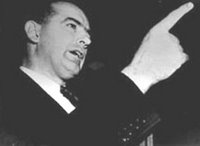 Senator McCarthy had everyone looking under the bed for Commies in the 1950s; there were blacklists, arrests subpoenas, firings, etc. As for the economy, NY Times columnist and economist Paul Krugman has said that we've been in the middle of a jobless recovery. I think it's safe to say that with high oil prices left over from last year's hurricane season and saber rattling with Iran that threatens more inflation, another recession might be on the horizon. But again, this economic slowdown is nothing new for the American people. We're not sailing on uncharted waters here. Oil prices shot up after Iraq's invasion of Kuwait in the summer of 1990 helping trigger a recession, and previously, America's support of Israel in the Yom Kippur War in 1973 led to an embargo (and rising oil prices) in the mid 70s which led to scary inflationary times. There was a recession from 1979-82. Both recessions also had a slow recovery time also. So, we've been down this road before.
Senator McCarthy had everyone looking under the bed for Commies in the 1950s; there were blacklists, arrests subpoenas, firings, etc. As for the economy, NY Times columnist and economist Paul Krugman has said that we've been in the middle of a jobless recovery. I think it's safe to say that with high oil prices left over from last year's hurricane season and saber rattling with Iran that threatens more inflation, another recession might be on the horizon. But again, this economic slowdown is nothing new for the American people. We're not sailing on uncharted waters here. Oil prices shot up after Iraq's invasion of Kuwait in the summer of 1990 helping trigger a recession, and previously, America's support of Israel in the Yom Kippur War in 1973 led to an embargo (and rising oil prices) in the mid 70s which led to scary inflationary times. There was a recession from 1979-82. Both recessions also had a slow recovery time also. So, we've been down this road before.
Unfortunately, we've also been in the heavily traveled freeway of continuous war before. The war on terrorism and the Cold War can be seen as similar, but I surely hope it doesn't take 45 years to eradicate global terrorism. Along the way in the Cold War, there were less than decisive victories and losses - Korea and Vietnam come to mind. In the war on terror (WOT), uh... Afghanistan and Iraq come to mind. Afghanistan is a victory in some folks' minds b/c we knocked the Taliban from power and installed someone (Hamid Karzai) who's friendly to us. Unfortunately, the Taliban are still tooling around the country and making life miserable for the Afghanis. Iraq's evil dictator Saddam Hussein fell w/in 3 weeks despite warnings of American soldiers being gassed by Chemical Ali once they crossed the red ring (on defense planners' maps) around Baghdad. It took another nine months to find Hussein and thankfully he'll die for his crimes at the hands of the Iraqi people and not us. Iraq and Vietnam are similar in many ways, but one way they are NOT similar is in the death toll of American soldiers. I don't know if we're tough enough to take the death toll that Americans endured during Vietnam when sometimes a thousand soldiers died in one week. We are currently around 2,600 Americans dead in Iraq and over 15,000 wounded since March 2003. I mean, Americans (and the dovish Clinton administration) freaked out when they saw pictures of some of the 19 dead elite American soldiers paraded through the city of Mogadishu, Somalia in October 1993. After that, we promptly fled the country. Even the icon of Republican moxy and toughness, Ronald Reagan, cut and ran in 1983 when 241 soldiers were killed in a horrific truck bombing. And, the worst and probably least known part about this whole thing is that a retaliation was called off at the last minute b/c it might damage relations with other Arab nations. I have to hand it to the cowboy from Crawford, Texas: he has stayed put come hell or high water.
It took another nine months to find Hussein and thankfully he'll die for his crimes at the hands of the Iraqi people and not us. Iraq and Vietnam are similar in many ways, but one way they are NOT similar is in the death toll of American soldiers. I don't know if we're tough enough to take the death toll that Americans endured during Vietnam when sometimes a thousand soldiers died in one week. We are currently around 2,600 Americans dead in Iraq and over 15,000 wounded since March 2003. I mean, Americans (and the dovish Clinton administration) freaked out when they saw pictures of some of the 19 dead elite American soldiers paraded through the city of Mogadishu, Somalia in October 1993. After that, we promptly fled the country. Even the icon of Republican moxy and toughness, Ronald Reagan, cut and ran in 1983 when 241 soldiers were killed in a horrific truck bombing. And, the worst and probably least known part about this whole thing is that a retaliation was called off at the last minute b/c it might damage relations with other Arab nations. I have to hand it to the cowboy from Crawford, Texas: he has stayed put come hell or high water.
Another thing that is similar to events in the past is the threat of instant annihilation, but instead this time the t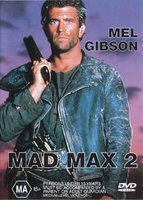 hreat isn't necessarily nuclear missiles from the sky. I had my nuclear awakening when I was in my early teens when I got a double whammy of Mad Max: The Road Warrior (1981) and The Day After (1983). The latter especially scared the daylights out of me. A 1982 survey found that fear of a nuclear holocaust was the "#1 concern for teenage boys and #2 among girls" (Holtz). Fear of an unwinnable nuclear winter was many a teenager's mind back then. But since the end of the Cold War and the advent of the WOT, now we can die in so many random ways: chemical gas attack in subways; bio attack in our water, air or food; small nuke smuggled in through our porous borders; dirty bombs; suicide attacks; random coordinated attacks like the ones in London last summer and the one in Madrid. There are so many ways we can die that duct tape and plastic sheeting won't save us.
hreat isn't necessarily nuclear missiles from the sky. I had my nuclear awakening when I was in my early teens when I got a double whammy of Mad Max: The Road Warrior (1981) and The Day After (1983). The latter especially scared the daylights out of me. A 1982 survey found that fear of a nuclear holocaust was the "#1 concern for teenage boys and #2 among girls" (Holtz). Fear of an unwinnable nuclear winter was many a teenager's mind back then. But since the end of the Cold War and the advent of the WOT, now we can die in so many random ways: chemical gas attack in subways; bio attack in our water, air or food; small nuke smuggled in through our porous borders; dirty bombs; suicide attacks; random coordinated attacks like the ones in London last summer and the one in Madrid. There are so many ways we can die that duct tape and plastic sheeting won't save us.
You'll hear more and more people say that we're in a new era. Yeah, terrorists now use computers to try and kill us instead of land line phones or mail bombs like they did in 1919 (or in Ted Kaczynski's case, as late as 1995). It's a frightening world out there. But, if you really think about it, it's always been a frightening world.
Holtz, Geoffrey T. Welcome to the Jungle: the Why Behind Generation X. New York: St. Martin's Griffin, 1995. 1-289. ISBN 0312132107
Have we really changed that much in the five years since 767s became missiles to be used against our skyscrapers? Americans are more suspicious of their neighbors and have lost a few rights in the name of liberty, but this is nothing new. It happened during the Red Scares of the 1920s and the 1950s. And in 1919-20, there were a lot more bombings then there have been since 2001-2006 (yet obviously with much less loss of life).
 Senator McCarthy had everyone looking under the bed for Commies in the 1950s; there were blacklists, arrests subpoenas, firings, etc. As for the economy, NY Times columnist and economist Paul Krugman has said that we've been in the middle of a jobless recovery. I think it's safe to say that with high oil prices left over from last year's hurricane season and saber rattling with Iran that threatens more inflation, another recession might be on the horizon. But again, this economic slowdown is nothing new for the American people. We're not sailing on uncharted waters here. Oil prices shot up after Iraq's invasion of Kuwait in the summer of 1990 helping trigger a recession, and previously, America's support of Israel in the Yom Kippur War in 1973 led to an embargo (and rising oil prices) in the mid 70s which led to scary inflationary times. There was a recession from 1979-82. Both recessions also had a slow recovery time also. So, we've been down this road before.
Senator McCarthy had everyone looking under the bed for Commies in the 1950s; there were blacklists, arrests subpoenas, firings, etc. As for the economy, NY Times columnist and economist Paul Krugman has said that we've been in the middle of a jobless recovery. I think it's safe to say that with high oil prices left over from last year's hurricane season and saber rattling with Iran that threatens more inflation, another recession might be on the horizon. But again, this economic slowdown is nothing new for the American people. We're not sailing on uncharted waters here. Oil prices shot up after Iraq's invasion of Kuwait in the summer of 1990 helping trigger a recession, and previously, America's support of Israel in the Yom Kippur War in 1973 led to an embargo (and rising oil prices) in the mid 70s which led to scary inflationary times. There was a recession from 1979-82. Both recessions also had a slow recovery time also. So, we've been down this road before.Unfortunately, we've also been in the heavily traveled freeway of continuous war before. The war on terrorism and the Cold War can be seen as similar, but I surely hope it doesn't take 45 years to eradicate global terrorism. Along the way in the Cold War, there were less than decisive victories and losses - Korea and Vietnam come to mind. In the war on terror (WOT), uh... Afghanistan and Iraq come to mind. Afghanistan is a victory in some folks' minds b/c we knocked the Taliban from power and installed someone (Hamid Karzai) who's friendly to us. Unfortunately, the Taliban are still tooling around the country and making life miserable for the Afghanis. Iraq's evil dictator Saddam Hussein fell w/in 3 weeks despite warnings of American soldiers being gassed by Chemical Ali once they crossed the red ring (on defense planners' maps) around Baghdad.
 It took another nine months to find Hussein and thankfully he'll die for his crimes at the hands of the Iraqi people and not us. Iraq and Vietnam are similar in many ways, but one way they are NOT similar is in the death toll of American soldiers. I don't know if we're tough enough to take the death toll that Americans endured during Vietnam when sometimes a thousand soldiers died in one week. We are currently around 2,600 Americans dead in Iraq and over 15,000 wounded since March 2003. I mean, Americans (and the dovish Clinton administration) freaked out when they saw pictures of some of the 19 dead elite American soldiers paraded through the city of Mogadishu, Somalia in October 1993. After that, we promptly fled the country. Even the icon of Republican moxy and toughness, Ronald Reagan, cut and ran in 1983 when 241 soldiers were killed in a horrific truck bombing. And, the worst and probably least known part about this whole thing is that a retaliation was called off at the last minute b/c it might damage relations with other Arab nations. I have to hand it to the cowboy from Crawford, Texas: he has stayed put come hell or high water.
It took another nine months to find Hussein and thankfully he'll die for his crimes at the hands of the Iraqi people and not us. Iraq and Vietnam are similar in many ways, but one way they are NOT similar is in the death toll of American soldiers. I don't know if we're tough enough to take the death toll that Americans endured during Vietnam when sometimes a thousand soldiers died in one week. We are currently around 2,600 Americans dead in Iraq and over 15,000 wounded since March 2003. I mean, Americans (and the dovish Clinton administration) freaked out when they saw pictures of some of the 19 dead elite American soldiers paraded through the city of Mogadishu, Somalia in October 1993. After that, we promptly fled the country. Even the icon of Republican moxy and toughness, Ronald Reagan, cut and ran in 1983 when 241 soldiers were killed in a horrific truck bombing. And, the worst and probably least known part about this whole thing is that a retaliation was called off at the last minute b/c it might damage relations with other Arab nations. I have to hand it to the cowboy from Crawford, Texas: he has stayed put come hell or high water.Another thing that is similar to events in the past is the threat of instant annihilation, but instead this time the t
 hreat isn't necessarily nuclear missiles from the sky. I had my nuclear awakening when I was in my early teens when I got a double whammy of Mad Max: The Road Warrior (1981) and The Day After (1983). The latter especially scared the daylights out of me. A 1982 survey found that fear of a nuclear holocaust was the "#1 concern for teenage boys and #2 among girls" (Holtz). Fear of an unwinnable nuclear winter was many a teenager's mind back then. But since the end of the Cold War and the advent of the WOT, now we can die in so many random ways: chemical gas attack in subways; bio attack in our water, air or food; small nuke smuggled in through our porous borders; dirty bombs; suicide attacks; random coordinated attacks like the ones in London last summer and the one in Madrid. There are so many ways we can die that duct tape and plastic sheeting won't save us.
hreat isn't necessarily nuclear missiles from the sky. I had my nuclear awakening when I was in my early teens when I got a double whammy of Mad Max: The Road Warrior (1981) and The Day After (1983). The latter especially scared the daylights out of me. A 1982 survey found that fear of a nuclear holocaust was the "#1 concern for teenage boys and #2 among girls" (Holtz). Fear of an unwinnable nuclear winter was many a teenager's mind back then. But since the end of the Cold War and the advent of the WOT, now we can die in so many random ways: chemical gas attack in subways; bio attack in our water, air or food; small nuke smuggled in through our porous borders; dirty bombs; suicide attacks; random coordinated attacks like the ones in London last summer and the one in Madrid. There are so many ways we can die that duct tape and plastic sheeting won't save us.You'll hear more and more people say that we're in a new era. Yeah, terrorists now use computers to try and kill us instead of land line phones or mail bombs like they did in 1919 (or in Ted Kaczynski's case, as late as 1995). It's a frightening world out there. But, if you really think about it, it's always been a frightening world.
Holtz, Geoffrey T. Welcome to the Jungle: the Why Behind Generation X. New York: St. Martin's Griffin, 1995. 1-289. ISBN 0312132107
Thursday, June 29, 2006
Some introductory quotes
To quote Nirvana, "Here we are now, entertain us." In a way, that's what we're about. In some ways, we fight against that definition.
To quote Pearl Jam, "Who's got the brain of JFK, and what does it mean to us now?" I love this quote because it crystalizes the distrust many of us have of our government - us, a generation raised on the X-Files. Hell, why does the 9/11/01 conspiracy theory resonate w/ so many of the millenials (those born after 1981)? Because they have even less trust in their government than we do.
More to come later.
To quote Pearl Jam, "Who's got the brain of JFK, and what does it mean to us now?" I love this quote because it crystalizes the distrust many of us have of our government - us, a generation raised on the X-Files. Hell, why does the 9/11/01 conspiracy theory resonate w/ so many of the millenials (those born after 1981)? Because they have even less trust in their government than we do.
More to come later.
Subscribe to:
Comments (Atom)


